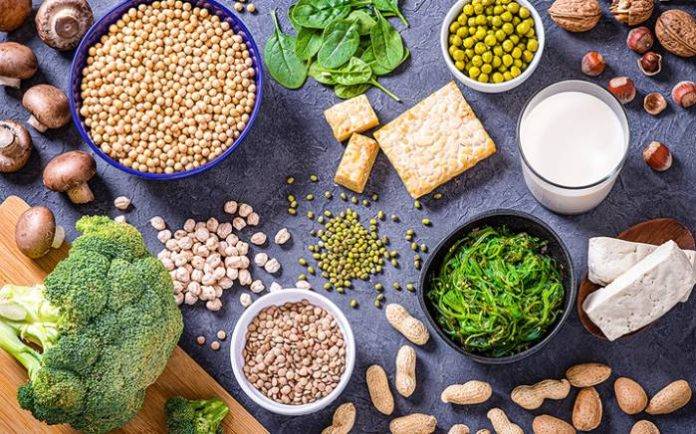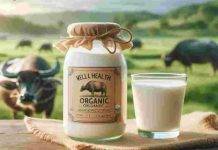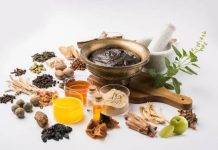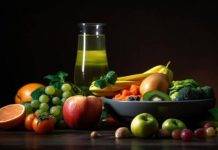Maintaining a balanced diet is crucial for overall health, and protein plays a significant role in building and repairing tissues, producing enzymes, and supporting immune function. For vegetarians, finding high-protein foods can be a bit challenging, but there are plenty of options available that can meet your protein needs. Let’s dive into some of the best high-protein foods for vegetarians that can help boost your health.
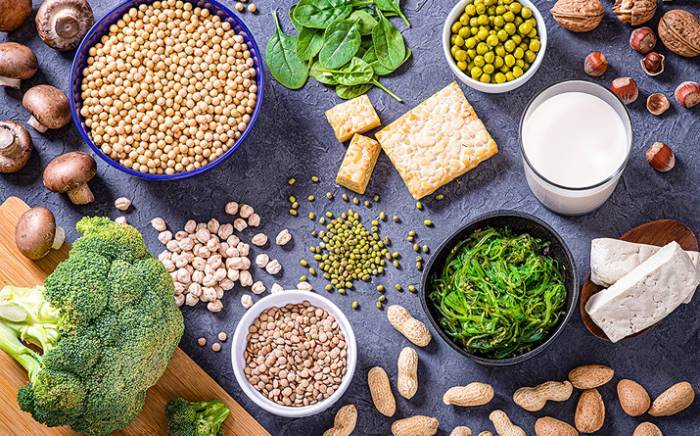
| Food Item | Protein Content (per 100g) | Calories (per 100g) | Additional Nutrients | Health Benefits |
|---|---|---|---|---|
| Lentils | 9.02g | 116 kcal | Iron, Fiber, Folate | Supports heart health, aids digestion, helps in muscle repair |
| Chickpeas | 8.86g | 164 kcal | Fiber, Manganese, Folate | Improves digestion, promotes satiety, stabilizes blood sugar levels |
| Quinoa | 14.12g | 120 kcal | Magnesium, Iron, Fiber | Gluten-free, high in antioxidants, supports metabolic health |
| Greek Yogurt | 10g | 59 kcal | Calcium, Vitamin B12, Probiotics | Supports bone health, improves gut health, aids in muscle recovery |
| Tofu | 8g | 76 kcal | Calcium, Iron, Magnesium | Lowers cholesterol, contains all essential amino acids, supports weight management |
| Edamame | 11.91g | 121 kcal | Fiber, Vitamin K, Folate | Rich in antioxidants, supports bone health, promotes cardiovascular health |
| Chia Seeds | 16.54g | 486 kcal | Omega-3 fatty acids, Fiber, Calcium | Boosts energy, supports heart health, aids in weight loss |
| Almonds | 21.15g | 579 kcal | Vitamin E, Magnesium, Fiber | Promotes heart health, supports brain function, helps in weight management |
| Hemp Seeds | 31.56g | 553 kcal | Omega-3 and Omega-6 fatty acids, Magnesium, Zinc | Supports immune health, improves skin health, provides sustained energy |
| Tempeh | 19g | 193 kcal | Calcium, Iron, Magnesium | Fermented, improves gut health, high in essential amino acids |
| Green Peas | 5.42g | 81 kcal | Fiber, Vitamin A, Vitamin C | Supports eye health, boosts immunity, aids in digestion |
| Spirulina | 57.47g | 290 kcal | Iron, B Vitamins, Omega-3 fatty acids | High antioxidant content, detoxifies heavy metals, supports brain health |
| Seitan | 25g | 370 kcal | Selenium, Iron, Calcium | High protein meat substitute, low in fat, versatile in cooking |
| Nutritional Yeast | 14g | 60 kcal | B Vitamins, Fiber, Protein | Enhances flavor, boosts energy, supports immune health |
| Pumpkin Seeds | 19g | 446 kcal | Magnesium, Zinc, Iron | Supports prostate health, high in antioxidants, promotes restful sleep |
| Cottage Cheese | 11g | 98 kcal | Calcium, Phosphorus, Selenium | Low in fat, supports muscle growth, helps in weight management |
| Black Beans | 8.86g | 132 kcal | Fiber, Folate, Potassium | Improves digestive health, supports heart health, helps regulate blood sugar |
| Peanuts | 25.8g | 567 kcal | Healthy fats, Vitamin E, Magnesium | Boosts heart health, supports brain function, helps in weight management |
| Sunflower Seeds | 20.78g | 584 kcal | Vitamin E, Magnesium, Selenium | Reduces inflammation, supports cardiovascular health, promotes skin health |
| Flaxseeds | 18.29g | 534 kcal | Omega-3 fatty acids, Fiber, Lignans | Supports digestive health, reduces cancer risk, helps regulate blood sugar |
Legumes and Pulses
Lentils
Lentils are a powerhouse of protein and are incredibly versatile. Whether in soups, stews, or salads, lentils offer about 18 grams of protein per cooked cup. They are also rich in fiber, iron, and folate, making them a nutritious choice for any meal.
Chickpeas
Chickpeas, also known as garbanzo beans, are not only high in protein but also fiber. They provide about 15 grams of protein per cooked cup. You can add them to salads, make hummus, or even roast them for a crunchy snack.
Black Beans
Black beans are another excellent source of protein, offering around 15 grams per cooked cup. They are perfect for making vegetarian chili, burritos, or simply adding to a grain bowl.
Nuts and Seeds
Almonds
Almonds are not only a great source of healthy fats but also protein, with about 6 grams per ounce. They make for a convenient snack or a tasty addition to salads and yogurts.
Chia Seeds
Chia seeds may be tiny, but they pack a powerful protein punch with about 4 grams per 2 tablespoons. They are also high in omega-3 fatty acids and fiber, making them a superfood worth including in your diet.
Hemp Seeds
Hemp seeds are another fantastic source of plant-based protein, offering around 10 grams per 3 tablespoons. They have a mild, nutty flavor and can be sprinkled on salads, smoothies, or oatmeal.
Dairy Products
Greek Yogurt
Greek yogurt is an excellent source of protein, providing about 10 grams per 100 grams serving. It’s also rich in probiotics, which are beneficial for gut health. Enjoy it plain, with fruits, or in smoothies.
Cottage Cheese
Cottage cheese is another dairy product high in protein, with around 11 grams per 100 grams serving. It’s versatile and can be eaten on its own, with fruits, or even added to savory dishes.
Cheese
Cheese, especially varieties like cheddar and mozzarella, can be a good source of protein. One ounce of cheddar cheese contains about 7 grams of protein. Use it in moderation as part of a balanced diet.
Soy Products
Tofu
Tofu, made from soybeans, is a staple in vegetarian diets and provides about 8 grams of protein per 100 grams. It’s highly versatile and can be used in a variety of dishes, from stir-fries to smoothies.
Tempeh
Tempeh is a fermented soy product that offers around 19 grams of protein per 100 grams. Its firm texture makes it a great meat substitute in many recipes, including sandwiches and salads.
Edamame
Edamame are young soybeans that are packed with protein, offering about 11 grams per 100 grams. They make a great snack or can be added to salads and stir-fries.
Whole Grains
Quinoa
Quinoa is a complete protein, meaning it contains all nine essential amino acids. It provides about 8 grams of protein per cooked cup and is a great addition to salads, bowls, or as a side dish.
Brown Rice
Brown rice, while not as high in protein as quinoa, still offers about 5 grams per cooked cup. Pair it with beans or lentils to create a protein-rich meal.
Barley
Barley is another nutritious whole grain that contains about 3.5 grams of protein per cooked cup. It’s great in soups, stews, and grain salads.
Vegetables
Spinach
Spinach is not only rich in vitamins and minerals but also provides about 5 grams of protein per cooked cup. Add it to smoothies, salads, or sauté it as a side dish.
Broccoli
Broccoli is a protein-rich vegetable with about 4 grams per cooked cup. It’s versatile and can be steamed, roasted, or added to various dishes.
Peas
Peas are another excellent vegetable source of protein, offering around 8 grams per cooked cup. They can be added to soups, stews, or enjoyed as a side dish.
Fruits
Avocado
Avocados are known for their healthy fats, but they also contain about 3 grams of protein per cup. They’re perfect for adding to salads, sandwiches, or making guacamole.
Guava
Guava is a tropical fruit that provides about 4.2 grams of protein per cup. It’s delicious eaten fresh or added to smoothies and fruit salads.
Kiwi
Kiwi is not only rich in vitamin C but also offers about 2 grams of protein per cup. It’s a refreshing addition to fruit salads and smoothies.
Protein Supplements
Plant-based Protein Powders
Plant-based protein powders, such as those made from pea, hemp, or rice protein, are a convenient way to boost your protein intake. They can be added to smoothies, oatmeal, or baked goods.
Protein Bars
Protein bars are a quick and easy snack that can help you meet your protein needs. Look for those with natural ingredients and minimal added sugars.
Spirulina
Spirulina is a blue-green algae that is incredibly high in protein, providing about 4 grams per tablespoon. It can be added to smoothies or taken as a supplement.
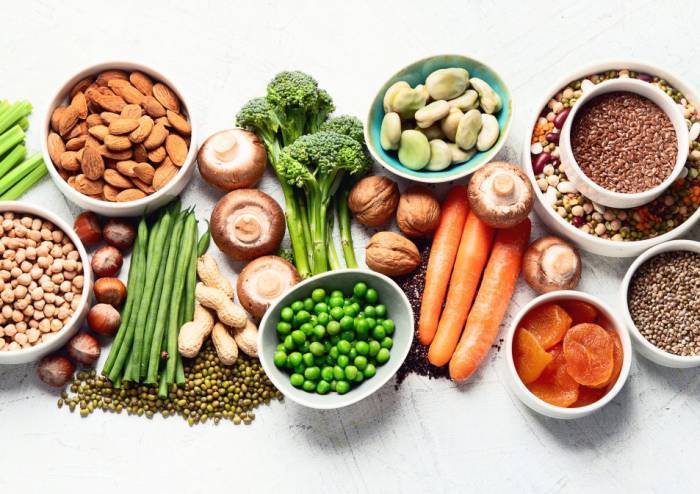
Combining Foods for Complete Proteins
Rice and Beans
Combining rice and beans creates a complete protein, providing all essential amino acids. This classic combination is not only nutritious but also delicious and versatile.
Hummus and Pita
Hummus, made from chickpeas, paired with whole grain pita, makes for a tasty snack that offers complete protein. It’s a great option for a quick and satisfying bite.
Peanut Butter and Whole Grain Bread
Peanut butter on whole grain bread is another example of a complete protein. This simple combination is perfect for breakfast or a snack.
Health Benefits of a High Protein Diet
Muscle Building
Protein is essential for muscle growth and repair. Including high-protein foods in your diet can help you build and maintain muscle mass, especially if you’re active or working out regularly.
Weight Management
A high-protein diet can aid in weight management by promoting satiety and reducing cravings. Protein-rich foods help you feel fuller for longer, which can prevent overeating.
Improved Metabolism
Protein has a higher thermic effect compared to fats and carbohydrates, meaning your body burns more calories digesting protein. This can help boost your metabolism and support weight loss efforts.
Common Myths About Protein in Vegetarian Diets
Myth: Vegetarians Can’t Get Enough Protein
Many people believe that vegetarians can’t get enough protein, but there are plenty of high-protein plant-based foods that can meet your needs. By including a variety of these foods in your diet, you can easily get sufficient protein.
Myth: Plant Proteins Are Inferior
Another myth is that plant proteins are inferior to animal proteins. While some plant proteins may not be complete on their own, combining different plant foods can provide all essential amino acids.
Myth: High Protein Diets Are Only for Meat-Eaters
High protein diets are often associated with meat-eaters, but vegetarians can also benefit from a high protein intake. By focusing on high-protein plant-based foods, vegetarians can enjoy the same benefits.
Tips for Increasing Protein Intake
Meal Planning
Planning your meals ahead of time can help ensure you’re including high-protein foods in your diet. Batch cooking and meal prepping can make it easier to stick to your protein goals.
Snacking on High-Protein Foods
Incorporating high-protein snacks, such as nuts, seeds, and protein bars, into your diet can help boost your protein intake throughout the day.
Incorporating Protein into Every Meal
Try to include a source of protein in every meal, whether it’s tofu in your stir-fry, chickpeas in your salad, or yogurt in your breakfast. This will help you meet your daily protein needs more easily.
Potential Risks of a High Protein Diet
Kidney Issues
Consuming too much protein can put strain on the kidneys, especially in individuals with pre-existing kidney conditions. It’s important to balance your protein intake with other nutrients and consult with a healthcare provider if you have any concerns.
Digestive Problems
Some people may experience digestive issues, such as bloating or constipation, when consuming a high-protein diet. Ensuring adequate fiber intake and staying hydrated can help alleviate these symptoms.
Nutrient Imbalances
Focusing too heavily on protein at the expense of other nutrients can lead to imbalances. It’s important to maintain a balanced diet that includes a variety of nutrients from different food groups.
Conclusion
Incorporating high-protein foods into a vegetarian diet is not only possible but also highly beneficial. From legumes and nuts to dairy and soy products, there are plenty of delicious and nutritious options to choose from. By planning your meals and including a variety of protein-rich foods, you can boost your health and enjoy the many benefits of a high-protein diet.
























